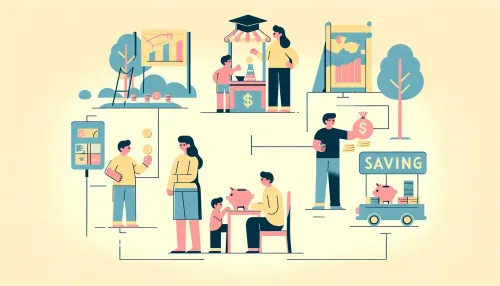Mastering Debt 101: A Beginner's Guide to Managing Debt Wisely

Understanding Consumer Debt: Types and Implications
Dealing with debt can be overwhelming, especially if you're new to personal finance. But fear not, as understanding the fundamental concepts and strategies for managing debt can pave the way toward financial freedom. In this comprehensive guide, we'll delve into the various aspects of managing debt wisely, from understanding different types of consumer debt to navigating through debt consolidation and refinancing options. Let's embark on this journey to equip you with the knowledge and tools needed to master debt effectively.
Consumer debt comes in various forms, each with its own implications on your financial health. It's crucial to comprehend the nuances of these debts to make informed decisions.
What is Credit Card Debt and Its Risks?
Credit cards are convenient financial tools, but their high-interest rates can lead to substantial debts if not managed prudently. Retail therapy and impulse purchases may seem harmless in the moment, but they can quickly snowball into significant credit card balances, affecting your overall financial stability.
The Impact of Student Loans on Financial Health
For many individuals, pursuing higher education involves taking out student loans. While investing in education is commendable, excessive student loan debts can linger for years, impacting your ability to achieve other financial milestones.
Becoming a homeowner often entails taking on mortgage debt. While mortgage loans enable you to fulfill the dream of owning a home, it's essential to strike a balance between homeownership and overall financial well-being.
Navigating Mortgage Debt: Homeownership Insights
These versatile loans can serve various purposes, from consolidating existing debts to funding a major purchase. However, they come with varying interest rates and terms that should be carefully evaluated before taking them on.
Related Article: The Power of Fiscal Stability: Mastering Cash Flow Management for Long-Term Solvency
Understanding Personal Loans and Their Uses
Understanding the implications of each type of consumer debt empowers you to make informed borrowing decisions aligned with your financial goals and circumstances.
Crafting a well-defined debt repayment strategy is crucial for regaining financial control. When formulating such a strategy, prioritizing high-interest debts lays the foundation for effective debt management.
Creating a Debt Repayment Strategy: Focus on High-Interest Debts
The avalanche method involves targeting debts with the highest interest rates first while making minimum payments on other obligations. By tackling high-interest debts proactively, you can minimize the long-term interest costs and expedite overall debt repayment.
Contrary to the avalanche approach, the snowball method emphasizes paying off the smallest debts first. This method may provide psychological boosts as smaller debts are cleared, offering a sense of accomplishment and motivation to continue tackling larger obligations.
How Does the Avalanche Method Work?
Debt consolidation and refinancing present viable solutions for streamlining multiple debts into more manageable payment structures.
The Snowball Method: A Motivational Approach to Repayment
Consolidating multiple debts into a single loan or line of credit simplifies repayment efforts by amalgamating various obligations into one convenient payment. It also has the potential to lower overall interest costs, particularly if a lower interest rate is secured.
Refinancing involves replacing an existing loan with a new one featuring better terms. This strategy is especially beneficial when aiming to reduce interest rates on outstanding debts, ultimately contributing to accelerated debt repayment.
Debt Consolidation and Refinancing: Streamlining Your Payments
Technology offers an array of tools designed to facilitate effective debt management and monitoring.
What is Debt Consolidation and Its Benefits?
Numerous budgeting apps empower users to track spending patterns, set financial goals, and create personalized repayment plans, providing comprehensive insights into their financial standing.
Utilizing spreadsheets tailored for tracking debts allows individuals to visualize their progress, monitor interest accruals, and strategize their repayment efforts efficiently.
The Advantages of Refinancing Your Loans
While managing debts diligently is paramount, it's equally essential to safeguard your credit score throughout this process.
Tools for Tracking Debt Repayment Progress Effectively
Consistently making on-time payments reflects positively on your credit report, demonstrating responsible financial behavior essential for maintaining a healthy credit score.
Monitoring credit utilization ratios ensures that you're not excessively tapping into available credit limits, thereby averting negative impacts on your credit score.
Related Article: The Gig Economy's Financial Frontier: Navigating Personal Finance and Investing as a Freelancer
The Role of Budgeting Apps in Debt Management
In conclusion, mastering debt entails a combination of informed decision-making, strategic planning, and disciplined execution. By understanding the nuances of different types of consumer debt, devising effective repayment strategies, leveraging consolidation and refinancing options where suitable, utilizing tracking tools for ongoing progress monitoring, and safeguarding your credit score throughout the process, you can navigate through debt responsibly while working towards achieving long-term financial stability.
Using Debt Tracker Spreadsheets for Monitoring Progress
Remember that at Tycoon Trail Blog, we prioritize empowering our audience with invaluable financial insights for their journey toward prosperity and success.
Frequently Asked Questions
Consumer debt includes various forms such as credit card debt, student loans, mortgage debt, and personal loans. Each type has unique implications for your financial health, making it essential to understand them to make informed borrowing decisions aligned with your financial goals.
To create an effective debt repayment strategy, prioritize high-interest debts using methods like the avalanche method, which targets these debts first, or the snowball method, which focuses on paying off smaller debts for motivation. Both strategies can help you regain financial control and reduce overall interest costs.
Various tools can assist in tracking debt repayment progress, including budgeting apps that monitor spending and set financial goals, as well as debt tracker spreadsheets that visualize progress and strategize repayments. Utilizing these tools can enhance your overall debt management efforts.
Check Out These Related Articles

The Art of Raising Financially Savvy Kids: Parenting Hacks for Teaching Money Skills

Uniting for Wealth: The Rise of Community-Driven Personal Finance Platforms

Rethinking Personal Finance: When Ethics Override Traditional Returns

